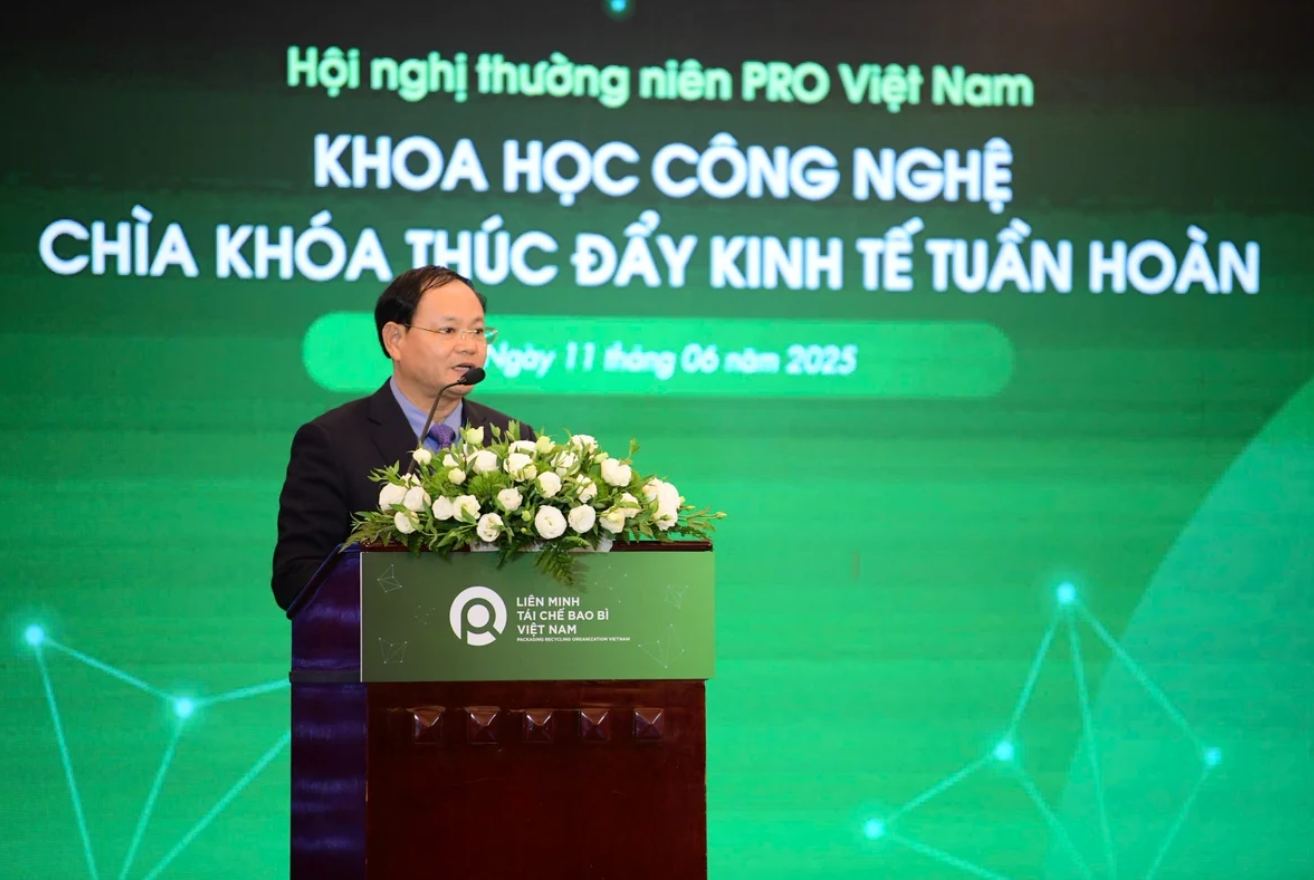At the 2025 Annual Conference of PRO Vietnam, Mr. Le Minh Ngan, Deputy Minister of Agriculture and Environment, shared insights on Vietnam’s efforts to develop a circular economy.
Among the highlights, the 2020 Environmental Protection Law was described as a groundbreaking legal milestone, marking the first time the circular economy model was institutionalized in Vietnam. According to Deputy Minister Ngan, this law represents more than a shift in waste management - it signifies a fundamental transformation in how the production-consumption chain is perceived and organized.
"The law mandates source separation of solid waste, charges for waste based on volume, and applies Extended Producer Responsibility (EPR) to promote recycling. These are critical mechanisms for extending product lifecycles and reducing environmental pressure," Deputy Minister Ngan emphasized.
 Deputy Minister Le Minh Ngan spoke at the Conference. Photo: Quang Dinh.
Deputy Minister Le Minh Ngan spoke at the Conference. Photo: Quang Dinh. Beyond the legal framework, he also underscored that Resolution 57-NQ/TW of the Politburo designates science, technology, innovation, and digital transformation as "the best opportunities for Vietnam to rise to become a strong and developed nation."
Notably, the national circular economy development scheme approved by the Prime Minister in 2022 sets ambitious targets: by 2025, recycling 85% of generated plastic waste; by 2030, collecting and properly treating 100% of urban organic waste and 70% in rural areas. These goals can only be achieved through investments in modern recycling technologies, low-emission systems, artificial intelligence, and the Internet of Things, enhancing forecasting, control, and operational capacity within the circular framework.
According to Deputy Minister Ngan, effective implementation requires the involvement of businesses, research institutes, universities, and the international community to build high-tech, circular economy models.
"The Vietnamese business community, various industries, and particularly the Packaging Recycling Alliance (PRO Vietnam), must continue to work hand-in-hand with the Government and the Ministry of Agriculture and Environment to protect the environment, transform and modernize production technologies, and apply science, innovation, and digital tools. This will help reduce waste, promote recycling, and accelerate the transition to a circular economy, contributing to the effective realization of Resolution 57-NQ/TW," he stated.
Various enterprises showcased their circular economy models during the event through technological investments. At TH Group, high technologies are applied throughout the value chain - from farm to factory and distribution networks. Cow manure is treated with biological methods, wastewater is reused through Dutch technologies, and post-consumer packaging is collected at retail points to be recycled into a second life for materials.
What distinguishes TH's model is that the circular process doesn't stop at the factory. Used packaging is returned via its retail systems and then recycled into new products. TH is one of the first companies to proactively and systematically implement the EPR policy - from designing innovative packaging to organizing its collection and recycling.
This model helps TH reduce waste treatment costs, optimize resource use, and enhance its reputation as a sustainable brand. In an era when consumers increasingly care about the origin and lifecycle of products, a cup of TH fresh milk is not just the result of dairy farming - it is proof of a closed, "green" lifecycle from beginning to end.
According to Mr. Pham Phu Ngoc Trai, Chairman of PRO Vietnam, for the circular economy to be widely implemented, it is crucial to "connect the three houses: the state, enterprises, and academic institutions" to create a synchronized ecosystem that aligns policy, technological capability, and human resources.
PRO Vietnam signed a cooperation agreement with Vietnam National University, Ho Chi Minh City to support research programs, technology transfer, and workforce development for the circular economy.
"This partnership will open up meaningful innovation spaces, enabling businesses to access scientific knowledge, update recycling technologies, and design environmentally compliant smart packaging," Mr. Trai emphasized.